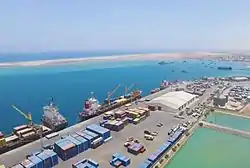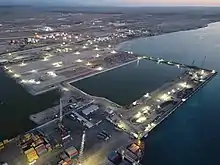Port of Berbera
The Port of Berbera (Somali: Dekedda Berbera, Arabic: ميناء بربرة), also known as Berbera Port, is the official seaport of Berbera, the commercial capital of Somaliland ,Somalia. It is classified as a major class port.[5]
| Port of Berbera ميناء بربرة Dekedda Berbera  | |
|---|---|
 Port of Berbera View. | |
| Location | |
| Country | |
| Location | Berbera |
| Coordinates | 10.438°N 44.997°E |
| UN/LOCODE | SOBBO[1] |
| Details | |
| Opened | 1969 |
| Operated by | DP World and Berbera Port Authority |
| Owned by | Somaliland Port Authority |
| Type of harbor | natural harbour |
| Available berths | 5[2] |
| Draft depth | 8.53 m.[3] |
| Managing Director | Ibrahim Eisa Alhammadi[4] |
| Statistics | |
| Website www www | |
Overview


Berbera Port historically served as a naval and missile base for the Somali central government. Following a 1962 agreement between The Somali Republic and The USSR, the port's facilities were upgraded and patronized by the Soviets.[6][7] It was later expanded for US military use, after the Somali authorities strengthened ties with the American government.[8]
As of 2013, the Port of Berbera has a 650-metre berth and a depth of 11.5–12 metres. It is strategically located along the oil route.
In July 2013, the Raysut Cement of Oman announced that it is scheduled to build a new state-of-the-art cement terminal at the Port of Berbera. The construction project is part of a joint venture with Somali business partners. It will comprise three silos with a 4000 t capacity each, which will be earmarked for storage, packing and distribution of cement.[9][10]

In May 2016, DP World signed a US$442 million agreement with the government of Somaliland, a self declared but unrecognised de facto sovereign state to operate a regional trade and logistics hub at the Port of Berbera.[11] The project, which will be phased in, will also involve the setting up of a free zone.
On 1 March 2018, Ethiopia became a major shareholder following an agreement with DP World and the Somaliland Port Authority. DP World holds a 51% stake in the project, Somaliland 30% and Ethiopia the remaining 19%. As part of the agreement, the government of Ethiopia will invest in infrastructure to develop the Berbera Corridor as a trade gateway for the inland country, which is one of the fastest growing countries in the world. There are also plans to construct an additional berth at the Port of Berbera, in line with the Berbera master plan, which DP World has started implementing, while adding new equipment to further improve efficiencies and productivity of the port.[12]
The agreement comes as part of a larger government-to-government Memorandum of understanding between Government of the United Arab Emirates and the Administration of Somaliland to further strengthen their strategic ties.[13] However, the agreement has stirred up debate with the main Somaliland opposition party, Waddani party arguing the agreement was between Somalia and the UAE, this claim was denied by the Minister of Foreign Affairs of Somalia stating that no evidence was produced indicating the Berbera port deal was signed with previous governments of Somalia.[14]
References
- "UNLOCODE (SO) - SOMALIA". www.unece.org. UNECE. Retrieved 3 September 2020.
- "Somalia Port of Berbera - Logistics Capacity Assessment - Digital Logistics Capacity Assessments". dlca.logcluster.org. Retrieved 21 May 2018.
- "Port of Berbera, Somalia". www.findaport.com. Shipping Guides Ltd. Retrieved 3 September 2020.
- "Berbera- Somaliland - DP World". web.dpworld.com. Retrieved 2017-12-27.
- "Istanbul conference on Somalia 21 – 23 May 2010 - Draft discussion paper for Round Table "Transport infrastructure"" (PDF). Government of Somalia. Retrieved 31 August 2013.
- Yordanov, Radoslav A. (2016). The Soviet Union and the Horn of Africa during the Cold War : Between Ideology and Pragmatism. p. 103. ISBN 1498529100.
- Hanhimäki, Jussi M. (2013). The Rise and Fall of Détente: American Foreign Policy and the Transformation of the Cold War. Potomac Books, Inc. ISBN 978-1612345864.
- Intercontinental Press Combined with Inprecor, Volume 20, Issues 25-37. Intercontinental Press. 1982. p. 674.
- "Raysut making moves in Somalia, Yemen and UAE". Global Cement. 1 July 2013. Retrieved 10 November 2014.
- "Oman's Raysut Cement Company to invest in expansion plans". World Cement. 11 June 2013. Archived from the original on 22 December 2014. Retrieved 10 November 2014.
- "Somalia project opens up Africa for DP World". thenational.ae. 30 May 2016. Retrieved 30 May 2016.
- "Ethiopia acquires 19% stake in DP World Berbera Port" (PDF). Retrieved 21 May 2018.
- "Dubai's DP World Agrees to Manage Port in Somaliland for 30 Years". Wall Street Journal. 30 May 2016. Retrieved 30 May 2016.
- Reuters (2018-04-20). "DP World Should Rethink Port Deals in Somalia-Foreign Minister". The New York Times. ISSN 0362-4331. Retrieved 2018-04-22.